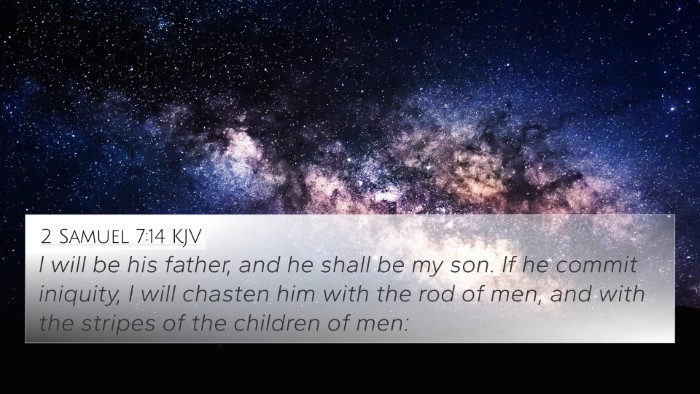Understanding Deuteronomy 8:5
Deuteronomy 8:5 states, "Thou shalt also consider in thine heart, that, as a man chasteneth his son, so the Lord thy God chasteneth thee." This verse emphasizes the relationship between God and His people, portraying God's discipline as a teaching mechanism akin to that used by a loving father towards his child.
Key Themes in Deuteronomy 8:5
- Parental Discipline: The comparison between God's chastening and that of a father to his son is a powerful theme that illustrates God's loving guidance.
- Spiritual Growth: Just as earthly fathers aim to cultivate character and righteousness in their children, God's discipline serves a similar purpose in spiritual development.
- Divine Relationship: This verse underlines the personal relationship between God and the believer, where discipline is seen as a sign of care and love.
- Reflection and Awareness: Believers are called to reflect on their experiences of discipline as an opportunity for growth and introspection.
Commentary Insights
According to Matthew Henry, this verse is a reminder that hardships and trials can be seen as God's way of teaching His children. They are not punitive, but corrective, intended to bring about improvement and understanding of God’s ways.
Albert Barnes notes that the notion of God chastening His people is central in the biblical narrative. He emphasizes that this should cultivate an understanding of God’s justice and moral nature, prompting the believer to seek righteousness.
Adam Clarke elaborates on the significance of considering God's actions in the light of parental care, suggesting that God’s discipline leads to the ultimate good for His children, instilling in them both reverence and obedience.
Bible Verse Cross-References
Deuteronomy 8:5 connects with several other scriptures that reveal similar themes of divine discipline and care:
- Proverbs 3:11-12: "My son, despise not the chastening of the Lord; neither be weary of his correction: For whom the Lord loveth he correcteth; even as a father the son in whom he delighteth." - This verse further reinforces the idea of God’s loving discipline.
- Hebrews 12:5-6: "And ye have forgotten the exhortation which speaketh unto you as unto children, My son, despise not thou the chastening of the Lord, nor faint when thou art rebuked of him." - The New Testament perspective on discipline as a sign of sonship.
- Job 5:17: "Behold, happy is the man whom God correcteth: therefore despise not thou the chastening of the Almighty." - The happiness that comes from being corrected by God.
- Psalm 94:12: "Blessed is the man whom thou chastenest, O Lord, and teachest him out of thy law." - The teaching aspect of God’s chastening as a form of blessing.
- Revelation 3:19: "As many as I love, I rebuke and chasten: be zealous therefore, and repent." - Christ's call to repentance alongside His loving rebuke.
- Romans 8:28: "And we know that all things work together for good to them that love God, to them who are the called according to his purpose." - A broader theological perspective on the purposes of God's actions.
- 2 Corinthians 6:9: "As unknown, and yet well known; as dying, and, behold, we live; as chastened, and not killed;" - The realities of living under divine discipline yet thriving.
Connections between Bible Verses
The connections between these verses reveal a consistent biblical theme that portrays God's dealings with humanity as that of a loving parent. The Bible cross-reference system enhances our understanding of how these scriptures interconnect, providing a comprehensive view of God’s character in relation to discipline.
Comparative Bible Verse Analysis
Cross-referencing Biblical texts allows us to see the rich tapestry of God’s teachings. The thematic connections found in Deuteronomy 8:5 with verses like Proverbs 3:11-12 and Hebrews 12:5-6 invite believers to consider their life challenges as opportunities for spiritual refinement rather than mere punishment. This comparative study between Old and New Testament teachings shows a continuation of God's principles over time.
Practical Application
In studying this verse and its connections, believers can develop a framework for understanding difficulties they face. Embracing the idea that challenges are part of God’s fatherly discipline can transform a hard heart into one of hope and trust in God’s plan.
Tools for Bible Cross-Referencing
Utilizing a bible concordance or a bible cross-reference guide can significantly aid in identifying these themes in scripture. Comprehensive Bible cross-reference materials provide context and deeper understanding for anyone studying God's word.
Conclusion
In summary, Deuteronomy 8:5 emphasizes that God's chastening is akin to that of a loving father, designed for correction and growth. By recognizing this, one can find solace in the idea that challenges serve not to deceive or injure, but to encourage maturity in faith.















